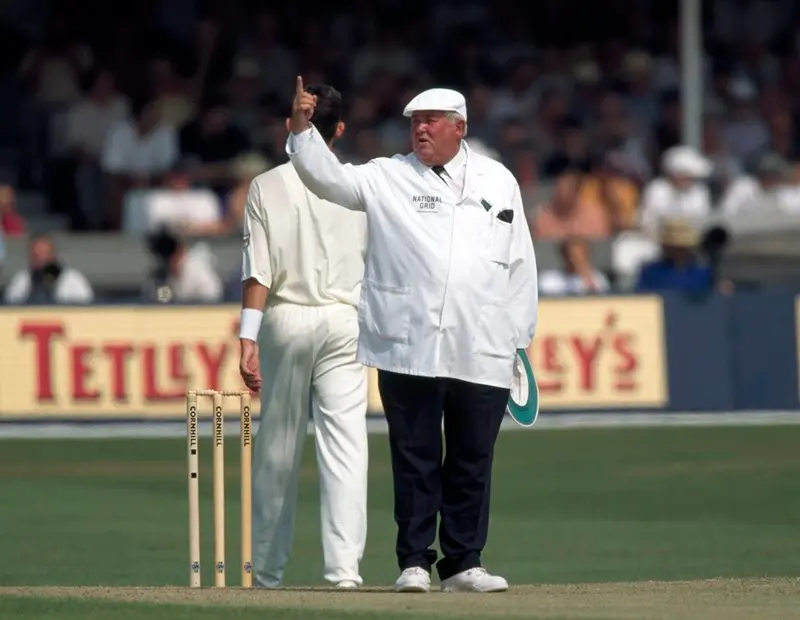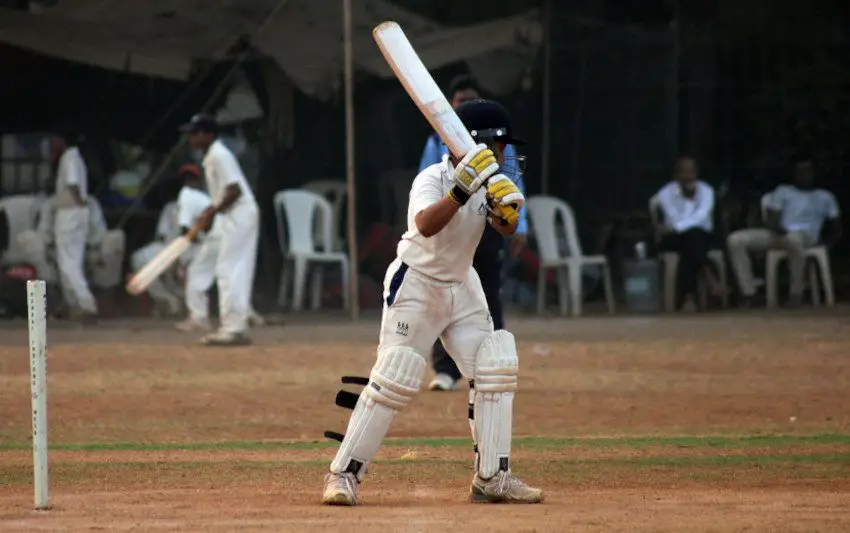Table of Contents
It’s time to take a look at one of the real characters of cricket. Here is a condensed biography of the umpire David Shepherd.
Playing Career
Before he took on the white coat, David Shepherd enjoyed a long career as a county cricketer in England. He was loyal to just one team, playing for Gloucestershire between 1965 and 1979.
While he was a steady batsman at domestic level, Shepherd’s statistics did little to attract the attention of the England selectors. His batting average finished at a shade under 25 and he scored 12 first class hundreds in 16 seasons with a best of 153.
He could score quickly and made some useful runs in One Day Cricket, but David Shepherd’s overall playing career could be described as ‘modest’.
Umpiring Information
After retirement, David Shepherd would become far more successful on the domestic and international umpiring circuit.

Debut
Having passed his qualifications, Shepherd was confirmed as a standing official on the English first class circuit for the 1981 season. He enhanced his reputation while umpiring in the County Championship and in the domestic one day competitions.
The ODI World Cup returned to England for the third consecutive edition in 1983 and a wide set of officials would be required. As one of the best umpires on the English circuit, David Shepherd was promoted to the panel.
Progress continued and he umpired in his first test match during the Ashes series of 1985. He officiated in the fourth test at Old Trafford, alongside the vastly experienced Dickie Bird.
As international cricket expanded and the requirement for neutral umpires was established, David Shepherd began to make a name for himself overseas. He was promoted to the International Cricket Council’s first ever elite panel in 2002 and was part of the team that officiated in the 2003 World Cup in South Africa.
Shepherd’s performances remained at a consistently high level and he stayed on that elite panel until his retirement in 2005.
The 111 Dance/Jump Up
While he was highly respected as an umpire, David Shepherd will largely be remembered for one eccentric characteristic. In English cricket in particular, the number 111 is said to be unlucky.
When a team or an individual batter gets to 111, it’s called a Nelson after the famous English Admiral. For David Shepherd, in order to counteract any bad luck that a Nelson might bring, he would begin to stand on one leg.
Because it’s impossible to stand still in this position for too long, Shepherd would involuntarily hop on one leg so he appeared to be dancing. He would stay like this until another run was scored and the team or the player got away from the dreaded Nelson.
Reputation as a World Class Umpire
Davis Shepherd was highly respected across the cricketing world. 2005 was his final year as an umpire and, in the One Day series between New Zealand and Australia, he was given a guard of honour by the two teams.
Later on, after he had officiated in his final test between the West Indies and Pakistan, he was presented with a bat by Brian Lara. Shepherd was also given the chance to officiate in an Ashes test of that summer, but it went against the ICC’s policy of neutral umpires at the time and he declined.
After David Shepherd sadly passed away in 2009, fellow official Simon Taufel wrote a glowing obituary in Wisden. It spoke of his great man management skills and the ease that he put players in, which contributed to a happy and mutually respectful playing environment.
David Shepherd Cricket Trust
The David Shepherd Cricket Trust proudly carries on the great man’s name. It was formed after a merger of two existing charities and it is a trust which aims to develop young cricket players in the county of Devon.
There are two main aims of the David Shepherd Cricket Trust. Firstly, at a time when many schools are struggling to supply facilities, it will look to provide a place for them to play.
Secondly, the trust aims to help those with exceptional talent to progress and maybe become future stars of the game. It’s certainly a cause that David Shepherd would be proud to be associated with.
Final Thoughts
The game really needs its characters and David Shepherd will be fondly remembered for so many reasons. That 111 dance is still repeated by some members of international cricket crowds, but we shouldn’t just think of his eccentricities.
As an umpire, David Shepherd was exceptionally good at his job. Everyone makes mistakes and every official’s biggest errors will continue to be well documented. In the case of Shepherd, those mistakes were very few and he got the vast majority of calls right.
Personally, I think the final word goes to that Wisden Obituary written by fellow umpire Simon Taufel. ‘The authorities struggle for a definition of the Spirit of Cricket. Perhaps the best answer is David Shepherd.’


